April 19 may mean nothing to most people, but to ASU mathematics professor Juan Carlos Jimenez it means freedom. That is the day he escaped from the ruthless grip of Fidel Castro’s Cuba.
Jimenez shared what he witnessed as a child growing up in Cuba during the rise of Castro’s dictatorship with an audience at the Downtown campus Thursday night.
His lecture was part of the Humanities Lecture Series coordinated by Mirna Lattouf, a professor in the School of Letters and Sciences. She felt that Jimenez’s story gave a more humane approach to the current conversation about immigration.
“He was an illegal refugee, and we are dealing with unlegalized citizens,” Latouff said. “I felt his story would give a more humane perspective.”
Jimenez used photos to show a Cuba before Castro.
As a young boy growing up in Cuba, Jimenez and his family had a pretty wealthy lifestyle, he said. His father was a businessman and his mother was a writer and radio broadcaster.
Jimenez described Cuba before Castro as a very prosperous country.
“[Cuba] had more radio stations than most countries,” Jimenez said. “Their industrial wages was I think … number eight in the world. The infrastructure was up to par with the United States, we had more telephones [and] more color TVs than most countries.”
Once Castro had started a revolution in Cuba and finally took over, things changed for the worse, especially for his family, Jimenez said.
After one of Jimenez’s family members convinced his mother to help Castro’s rebels during the Cuban Revolution, she persuaded his father to obtain radio transmitters for the rebel army. But the war ended before his father could hand the transmitters over to Castro’s men. His father was eventually caught with the transmitters and mistaken for a U.S. spy.
“My father was labeled a spy for the CIA so he was thrown in jail [and] my uncle was thrown in jail. They tortured both of them,” Jimenez said.
After the situation was explained to Castro, and Jimenez’s father and uncle were released, life got worse for his family. One day when his father was opening one of his businesses, the military showed up to take over.
“They said, ‘Give me the keys, it’s not your business anymore.’ So my father said, ‘Let me go in and get my papers,’ and they said, ‘If you go in we’ll shoot you,’” Jimenez said.
It was then that his father knew it was time for his family to leave Cuba and come to the U.S.
With the assistance of Brian Walsh, a priest who helped children get out of communist-run countries, 7-year-old Jimenez left Cuba for Miami with his younger sister and aunt.
“When I left Cuba, the only thing you could take with you was the clothes you had on your back,” Jimenez said.
His father told him that they were only going to be in Miami for a few days on vacation, but a few days turned into seven and a half years.
Jimenez realized that after two weeks of living in poor conditions he was not going back to Cuba.
Even though Jimenez has never returned to Cuba himself, he showed he realizes how fortunate he is. Jimenez presented facts and showed photos of the poor conditions current Cuban residents experience.
“It was good to see the story presented to [a] big audience as how he understood it,” political science and communication student Isai Jarez said.
Jarez is part Cuban himself and has heard stories from his family about Cuba. He said he found Jimenez’s lecture insightful and well structured, and there were some similarities in his own family’s stories.
Reach the reporter at shurst2@asu.edu





